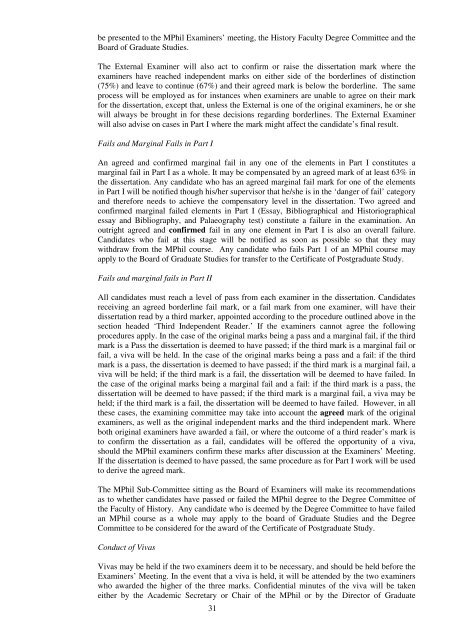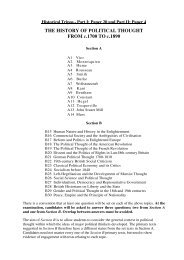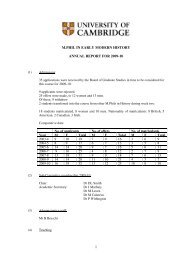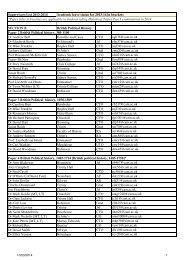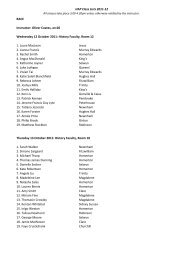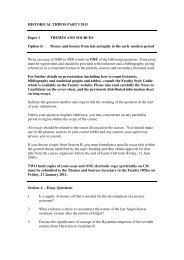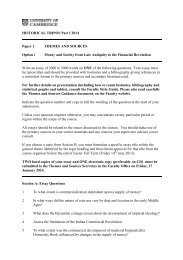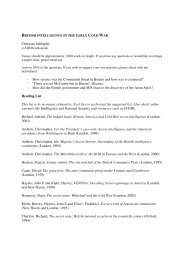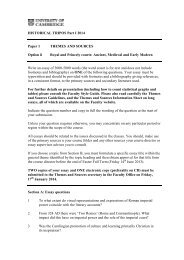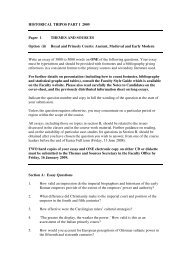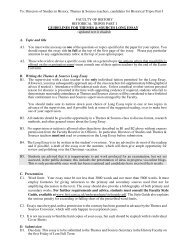Course Handbook - Faculty of History
Course Handbook - Faculty of History
Course Handbook - Faculty of History
You also want an ePaper? Increase the reach of your titles
YUMPU automatically turns print PDFs into web optimized ePapers that Google loves.
e presented to the MPhil Examiners’ meeting, the <strong>History</strong> <strong>Faculty</strong> Degree Committee and the<br />
Board <strong>of</strong> Graduate Studies.<br />
The External Examiner will also act to confirm or raise the dissertation mark where the<br />
examiners have reached independent marks on either side <strong>of</strong> the borderlines <strong>of</strong> distinction<br />
(75%) and leave to continue (67%) and their agreed mark is below the borderline. The same<br />
process will be employed as for instances when examiners are unable to agree on their mark<br />
for the dissertation, except that, unless the External is one <strong>of</strong> the original examiners, he or she<br />
will always be brought in for these decisions regarding borderlines. The External Examiner<br />
will also advise on cases in Part I where the mark might affect the candidate’s final result.<br />
Fails and Marginal Fails in Part I<br />
An agreed and confirmed marginal fail in any one <strong>of</strong> the elements in Part I constitutes a<br />
marginal fail in Part I as a whole. It may be compensated by an agreed mark <strong>of</strong> at least 63% in<br />
the dissertation. Any candidate who has an agreed marginal fail mark for one <strong>of</strong> the elements<br />
in Part I will be notified though his/her supervisor that he/she is in the ‘danger <strong>of</strong> fail’ category<br />
and therefore needs to achieve the compensatory level in the dissertation. Two agreed and<br />
confirmed marginal failed elements in Part I (Essay, Bibliographical and Historiographical<br />
essay and Bibliography, and Palaeography test) constitute a failure in the examination. An<br />
outright agreed and confirmed fail in any one element in Part I is also an overall failure.<br />
Candidates who fail at this stage will be notified as soon as possible so that they may<br />
withdraw from the MPhil course. Any candidate who fails Part 1 <strong>of</strong> an MPhil course may<br />
apply to the Board <strong>of</strong> Graduate Studies for transfer to the Certificate <strong>of</strong> Postgraduate Study.<br />
Fails and marginal fails in Part II<br />
All candidates must reach a level <strong>of</strong> pass from each examiner in the dissertation. Candidates<br />
receiving an agreed borderline fail mark, or a fail mark from one examiner, will have their<br />
dissertation read by a third marker, appointed according to the procedure outlined above in the<br />
section headed ‘Third Independent Reader.’ If the examiners cannot agree the following<br />
procedures apply. In the case <strong>of</strong> the original marks being a pass and a marginal fail, if the third<br />
mark is a Pass the dissertation is deemed to have passed; if the third mark is a marginal fail or<br />
fail, a viva will be held. In the case <strong>of</strong> the original marks being a pass and a fail: if the third<br />
mark is a pass, the dissertation is deemed to have passed; if the third mark is a marginal fail, a<br />
viva will be held; if the third mark is a fail, the dissertation will be deemed to have failed. In<br />
the case <strong>of</strong> the original marks being a marginal fail and a fail: if the third mark is a pass, the<br />
dissertation will be deemed to have passed; if the third mark is a marginal fail, a viva may be<br />
held; if the third mark is a fail, the dissertation will be deemed to have failed. However, in all<br />
these cases, the examining committee may take into account the agreed mark <strong>of</strong> the original<br />
examiners, as well as the original independent marks and the third independent mark. Where<br />
both original examiners have awarded a fail, or where the outcome <strong>of</strong> a third reader’s mark is<br />
to confirm the dissertation as a fail, candidates will be <strong>of</strong>fered the opportunity <strong>of</strong> a viva,<br />
should the MPhil examiners confirm these marks after discussion at the Examiners’ Meeting.<br />
If the dissertation is deemed to have passed, the same procedure as for Part I work will be used<br />
to derive the agreed mark.<br />
The MPhil Sub-Committee sitting as the Board <strong>of</strong> Examiners will make its recommendations<br />
as to whether candidates have passed or failed the MPhil degree to the Degree Committee <strong>of</strong><br />
the <strong>Faculty</strong> <strong>of</strong> <strong>History</strong>. Any candidate who is deemed by the Degree Committee to have failed<br />
an MPhil course as a whole may apply to the board <strong>of</strong> Graduate Studies and the Degree<br />
Committee to be considered for the award <strong>of</strong> the Certificate <strong>of</strong> Postgraduate Study.<br />
Conduct <strong>of</strong> Vivas<br />
Vivas may be held if the two examiners deem it to be necessary, and should be held before the<br />
Examiners’ Meeting. In the event that a viva is held, it will be attended by the two examiners<br />
who awarded the higher <strong>of</strong> the three marks. Confidential minutes <strong>of</strong> the viva will be taken<br />
either by the Academic Secretary or Chair <strong>of</strong> the MPhil or by the Director <strong>of</strong> Graduate<br />
31


